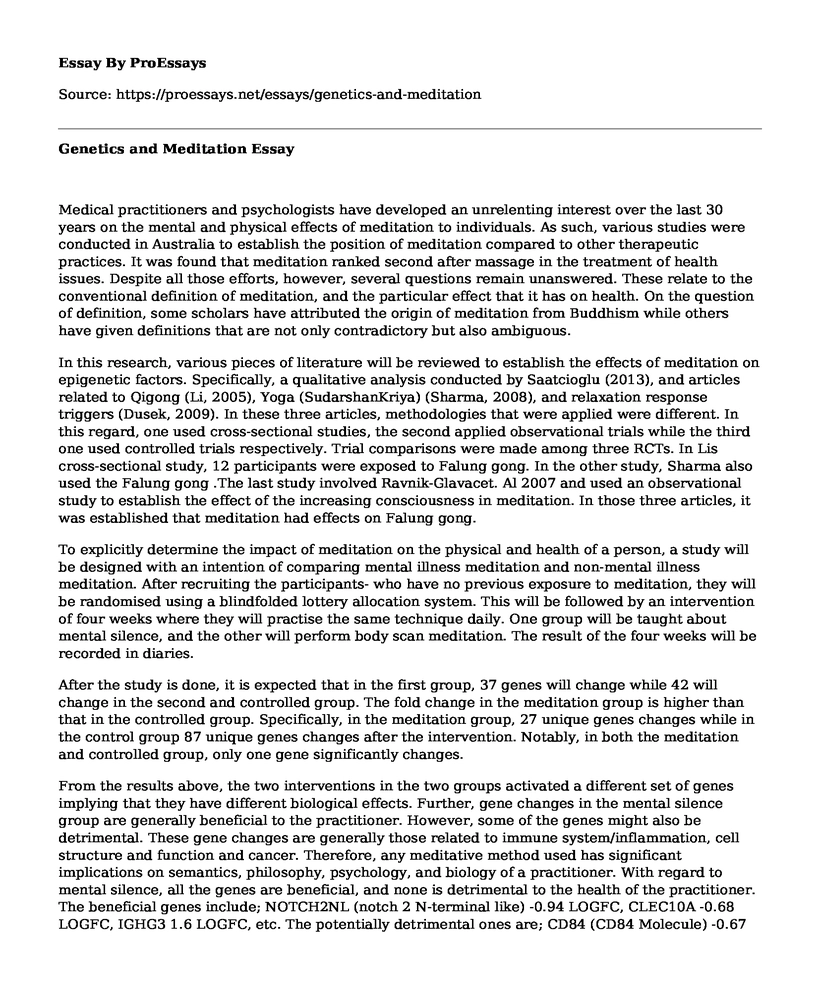Medical practitioners and psychologists have developed an unrelenting interest over the last 30 years on the mental and physical effects of meditation to individuals. As such, various studies were conducted in Australia to establish the position of meditation compared to other therapeutic practices. It was found that meditation ranked second after massage in the treatment of health issues. Despite all those efforts, however, several questions remain unanswered. These relate to the conventional definition of meditation, and the particular effect that it has on health. On the question of definition, some scholars have attributed the origin of meditation from Buddhism while others have given definitions that are not only contradictory but also ambiguous.
In this research, various pieces of literature will be reviewed to establish the effects of meditation on epigenetic factors. Specifically, a qualitative analysis conducted by Saatcioglu (2013), and articles related to Qigong (Li, 2005), Yoga (SudarshanKriya) (Sharma, 2008), and relaxation response triggers (Dusek, 2009). In these three articles, methodologies that were applied were different. In this regard, one used cross-sectional studies, the second applied observational trials while the third one used controlled trials respectively. Trial comparisons were made among three RCTs. In Lis cross-sectional study, 12 participants were exposed to Falung gong. In the other study, Sharma also used the Falung gong .The last study involved Ravnik-Glavacet. Al 2007 and used an observational study to establish the effect of the increasing consciousness in meditation. In those three articles, it was established that meditation had effects on Falung gong.
To explicitly determine the impact of meditation on the physical and health of a person, a study will be designed with an intention of comparing mental illness meditation and non-mental illness meditation. After recruiting the participants- who have no previous exposure to meditation, they will be randomised using a blindfolded lottery allocation system. This will be followed by an intervention of four weeks where they will practise the same technique daily. One group will be taught about mental silence, and the other will perform body scan meditation. The result of the four weeks will be recorded in diaries.
After the study is done, it is expected that in the first group, 37 genes will change while 42 will change in the second and controlled group. The fold change in the meditation group is higher than that in the controlled group. Specifically, in the meditation group, 27 unique genes changes while in the control group 87 unique genes changes after the intervention. Notably, in both the meditation and controlled group, only one gene significantly changes.
From the results above, the two interventions in the two groups activated a different set of genes implying that they have different biological effects. Further, gene changes in the mental silence group are generally beneficial to the practitioner. However, some of the genes might also be detrimental. These gene changes are generally those related to immune system/inflammation, cell structure and function and cancer. Therefore, any meditative method used has significant implications on semantics, philosophy, psychology, and biology of a practitioner. With regard to mental silence, all the genes are beneficial, and none is detrimental to the health of the practitioner. The beneficial genes include; NOTCH2NL (notch 2 N-terminal like) -0.94 LOGFC, CLEC10A -0.68 LOGFC, IGHG3 1.6 LOGFC, etc. The potentially detrimental ones are; CD84 (CD84 Molecule) -0.67 LOGFC, OSBPL8 (ox sterol binding protein-like 8) -0.75 LOGFC. Generally, it can be concluded that the practice of meditation leads to gene expression changes. These changes can either be beneficial or detrimental.
References
Dusek, J. A., & Benson, H. (2009). Mind-body medicine: a model of the comparative clinical impact of the acute stress and relaxation responses. Minnesota medicine, 92(5), 47.
Li, Q. Z., Li, P., Garcia, G. E., Johnson, R. J., & Feng, L. (2005). Genomic profiling of neutrophil transcripts in Asian Qigong practitioners: a pilot study in gene regulation by mind-body interaction. Journal of Alternative & Complementary Medicine, 11(1), 29-39.
Saatcioglu, F, Qu, S., Olafsrud, S. M., & Meza-Zepeda, L. A. (2013). Rapid gene expression changes in peripheral blood lymphocytes upon practice of a comprehensive yoga program. PloS one, 8(4), e61910.
Sharma, R. A. T. N. A., Gupta, N., & Bijlani, R. L. (2008). Effect of yoga based lifestyle intervention on subjective well-being. Indian J Physiol Pharmacol, 52(2), 123-131.
Slajpah, M., Gorinsek, B., Berginc, G., Vizjak, A., Ferluga, D., Hvala, A., ... & Kaplan-Pavlovcic, S. (2007). Sixteen novel mutations identified in COL4A3, COL4A4, and COL4A5 genes in Slovenian families with Alport syndrome and benign familial hematuria. Kidney international, 71(12), 1287-1295.
Cite this page
Genetics and Meditation. (2021, Mar 03). Retrieved from https://proessays.net/essays/genetics-and-meditation
If you are the original author of this essay and no longer wish to have it published on the ProEssays website, please click below to request its removal:
- Discrimination Against People With Mental Health Problems
- Genetics in Treating and Developing Cancer Paper Example
- Essay Example on Person-Centered, Gestalt and Behavior Therapy
- Adolescent Eating Disorders: The Impact of Social Media - Essay Sample
- Essay Example on Character & Respect: Keys to Success in Life
- Essay Sample on Overcoming Anxiety: What You Need to Know
- Experiencing Autism: The Challenges, Isolation, and Need for Change in Utah - Free Essay







